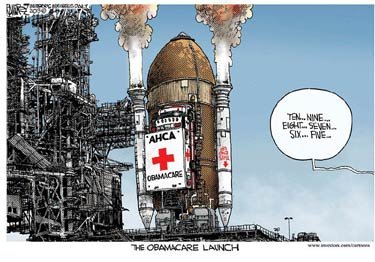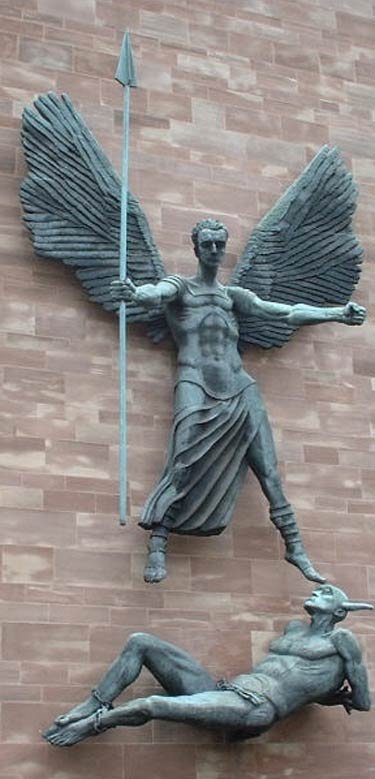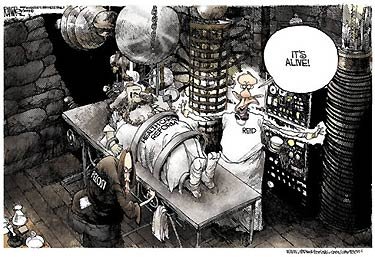Archive for September, 2013
30 Sep 2013


Even Obamacare supporter Harold Pollack now realizes that judgement time is coming to this country concerning the factual results of the Obama Administration’s and the democrat party’s great leap to the left and their nationalizing healthcare, some one sixth of the American economy.
I suspect the worst backlash won’t actually come from uninsured or under-insured people who actually buy coverage on the new exchanges. Backlash will come from people with pretty crummy jobs who hear that their hours are cut back. Backlash will come from people with limited employer-based coverage who face higher premiums or encounter other changes such as disliked wellness provisions. Some will look across the fence at decent plans on the new exchanges, only to discover that they can’t receive subsidies if they spurn their employer’s coverage.
Thousands of employers will blame “ObamaCare†for whatever unpopular moves they impose their workers. It’s the obvious play. In many cases, this blame will be mostly or entirely misplaced. Other times, the blame will be justified, reflecting glitches or unintended consequences of the new law. Either way, many workers will believe what their employers tell them. Millions of workers with relatively modest incomes will see their lives getting a little worse when they were hoping that health reform would make their lives a little better. …
At long last, we’re nearing put-up or shut-up time for the new law. ACA’s political fortunes will rest on whether it tangibly improves peoples’ lives. If it does that, the politics will take care of itself. If it doesn’t, Republicans won’t need Avik’s columns or anyone else’s to knock it down.
29 Sep 2013


IndieBound sings its praises:
A History of Britain in Thirty-six Postage Stamps tells the rich, layered, and breathtaking history of England through thirty-six of its fascinating, often beautiful, and sometimes eccentric postage stamps. West shows that stamps have always mirrored the events, attitudes, and styles of their time. Through them, one can glimpse the whole epic tale of an empire unfolding. From the famous Penny Black, printed soon after Queen Victoria’s coronation, to the Victory! stamp of 1946, anticipating the struggle of postwar reconstruction—A History of Britain in Thirty-six Postage Stamps is a hugely entertaining and idiosyncratic romp, told in Chris West’s lively prose.
On their own, stamps can be curiosities, even artistic marvels; in this book, stamps become a window into the larger sweep of history.
————————-
Sadie O. Stein, in Paris Review, also praises it.
I have a terrible feeling that A History of Britain in Thirty-Six Postage Stamps may be a hard sell for some readers. But trust me: Chris West’s cultural history is fast paced and engaging, and the organizing principle takes the narrative in all kinds of unexpected directions. Sure, there’s a little light philately in there, but even those who only communicate electronically will be glad they picked it up.
So I guess I have to read it, despite having zero interest in stamps.
Via Madame Scherzo.
29 Sep 2013


Jacob Epstein, The Victory of St. Michael Over the Devil, 1958, St. Michael’s New Cathedral, Coventry
From Robert Chambers, Book of Days, 1864:
Michaelmas Day, the 29th of September, properly named the day of St. Michael and All Angels, is a great festival of the Church of Rome, and also observed as a feast by the Church of England. In England, it is one of the four quarterly terms, or quarter-days, on which rents are paid, and in that and other divisions of the United Kingdom, as well as perhaps in other countries, it is the day on which burgal magistracies and councils are re-elected. The only other remarkable thing connected with the day is a widely prevalent custom of marking it with a goose at dinner.
Michael is regarded in the Christian world as the chief of angels, or archangel. His history is obscure. In Scripture, he is mentioned five times, and always in a warlike character; namely, thrice by Daniel as fighting for the Jewish church against Persia; once by St. Jude as fighting With the devil about the body of Moses; and once by St. John as fighting at the head of his angelic troops against the dragon and his host. Probably, on the hint thus given by St. John the Romish church taught at an early period that Michael was employed, in command of the loyal angels of God, to overthrow and consign to the pit of perdition Lucifer and his rebellious associates—a legend which was at length embalmed in the sublimest poetry by Milton.
Sometimes Michael is represented as the sole arch-angel, sometimes as only the head of a fraternity of archangels, which includes likewise Gabriel, Raphael, and some others. He is usually represented in coat-armour, with a glory round his head, and a dart in his hand, trampling on the fallen Lucifer. He has even been furnished, like the human warriors of the middle ages, with a heraldic ensign—namely, a banner hanging from a cross. We obtain a curious idea of the religious notions of those ages, when we learn that the red velvet-covered buckler worn by Michael in his war with Lucifer used to be shewn in a church in Normandy down to 1607, when the bishop of Avranches at length forbade its being any longer exhibited.
Angels are held by the Church of Rome as capable of interceding for men; wherefore it is that prayers are addressed to them and a festival appointed in their honour. Wheatley, an expositor of the Book of Common Prayer, probably expresses the limited view of the subject which is entertained in the Church of England, when he says, that ‘I the feast of St. Michael and All Angels is observed that the people may know what blessings are derived from the ministry of angels.’
Amongst Catholics, Michael, or, as he has been named, St. Michael, is invoked as ‘a most glorious and warlike prince,’ chief officer of paradise,’ I captain of God’s hosts,’ receiver of souls,’ ‘the vanquisher of evil spirits,’ and ‘the admirable general.’ It may also be remarked, that in the Sarum missal, there is a mass to St. Raphael, as the protector of pilgrims and travellers, and a skilful worker with medicine; likewise an office for the continual intercession of St. Gabriel and all the heavenly militia. Protestant writers trace a connection between the ancient notion of tutelar genii and the Catholic doctrine respecting angels, the one being, they say, ingrafted on the other. …
these notions of presiding angels and saints are what have led to the custom of choosing magistracies on the 29th of September. The history of the middle ages is full of curious illogical relations, and this is one of them. Local rulers were esteemed as in some respects analogous to tutelar angels, in as far as they presided over and protected the people. It was therefore thought proper to choose them on the day of St. Michael and All Angels. The idea must have been extensively prevalent, for the custom of electing magistrates on this day is very extensive,
‘September, when by custom (right divine)
Geese are ordained to bleed at Michael’s shrine’
says Churchill. This is also an ancient practice, and still generally kept up, as the appearance of the stage-coaches on their way to large towns at this season of the year amply testifies. In Blount’s Tenures, it is noted in the tenth year of Edward IV, that John de la Hay was bound to pay to William Barnaby, Lord of Lastres, in the county of Hereford, for a parcel of the demesne lands, one goose fit for the lord’s dinner, on the feast of St. Michael the archangel. Queen Elizabeth is said to have been eating her Michaelmas goose when she received the joyful tidings of the defeat of the Spanish Armada. The custom appears to have originated in a practice among the rural tenantry of bringing a good stubble goose at Michaelmas to the landlord, when paying their rent, with a view to making him lenient. In the poems of George Gascoigne, 1575, is the following passage:
And when the tenants come to pay their quarter’s rent,
They bring some fowl at Midsummer, a dish of fish in Lent,
At Christmas a capon, at Michaelmas a goose,
And somewhat else at New-year’s tide, for fear their lease fly loose.’
We may suppose that the selection of a goose for a present to the landlord at Michaelmas would be ruled by the bird being then at its perfection, in consequence of the benefit derived from stubble-feeding. It is easy to see how a general custom of having a goose for dinner on Michaelmas Day might arise from the multitude of these presents, as land-lords would of course, in most cases, have a few to spare for their friends. It seems at length to have become a superstition, that eating of goose at Michaelmas insured easy circumstances for the ensuing year. In the British Apollo, 1709, the following piece of dialogue occurs:
‘Q: Yet my wife would persuade me (as I am a sinner)
To have a fat goose on St. Michael for dinner:
And then all the year round, I pray you would mind it,
I shall not want money—oh, grant I may find it!
Now several there are that believe this is true,
Yet the reason of this is desired from you.
A: We think you’re so far from the having of more,
That the price of the goose you have less than before:
The custom came up from the tenants presenting
Their landlords with geese, to incline their relenting
On following payments, &c.’
————————————-
Wikipedia:
In late medieval Christianity, Michael, together with Saint George, became the patron saint of chivalry and is now also considered the patron saint of police officers, paramedics, and the military.
In mid to late 15th century, France was one of only four courts in Western Christendom without an order of knighthood. Later in the 15th century, Jean Molinet glorified the primordial feat of arms of the archangel as “the first deed of knighthood and chivalrous prowess that was ever achieved.” Thus Michael was the natural patron of the first chivalric order of France, the Order of Saint Michael of 1469. In the British honours system, a chivalric order founded in 1818 is also named for these two saints, the Order of St Michael and St George. The Order of Michael the Brave is Romania’s highest military decoration.
Apart from his being a patron of warriors, the sick and the suffering also consider Archangel Michael their patron saint. Based on the legend of his 8th century apparition at Mont-Saint-Michel, France, the Archangel is the patron of mariners in this famous sanctuary. After the evangelisation of Germany, where mountains were often dedicated to pagan gods, Christians placed many mountains under the patronage of the Archangel, and numerous mountain chapels of St. Michael appeared all over Germany. Since the victorious Battle of Lechfeld against the Hungarians in 955, Michael was the patron saint of the Holy Roman Empire and still is the patron saint of modern Germany and other German speaking regions formerly covered by the realm.
He has been the patron saint of Brussels since the Middle Ages. The city of Arkhangelsk in Russia is named for the Archangel. Ukraine and its capital Kiev also consider Michael their patron saint and protector.
An Anglican sisterhood dedicated to Saint Michael under the title of the Community of St Michael and All Angels was founded in 1851. The Congregation of Saint Michael the Archangel (CSMA), also known as the Michaelite Fathers, is a religious order of the Roman Catholic Church founded in 1897.
————————————-
The tradition of celebrating the feast day of the warrior angel saint persists in Central Pennsylvania up to today, particularly in Mifflin County, which is holding a Community Goose Day Dinner today at 3:00 at the Brooklyn Firehouse on Main Street in Lewistown.
28 Sep 2013

Hat tip to Robert Duvall.
28 Sep 2013


On the eve of Obamacare’s arrival, Mark Steyn assesses what the age of Obama has accomplished for Americans.
President Obama has added six-and-a-half trillion bucks to the national debt, and has nothing to show for it. As Churchill would say, had his bust not been bounced from the Oval Office, never in the field of human spending has so much been owed by so many for so little. …
My colleague Michelle Malkin revealed this week that her family has now joined the massed ranks of Obamacare victims: Anthem BlueCross BlueShield sent her a “Dear John†letter, explaining why they’d be seeing less of each other. “To meet the requirements of the new laws, your current plan can no longer be continued beyond your 2014 renewal date.â€
Beyond the president’s characteristically breezy lie that “if you like your health care plan, you will be able to keep your health care plan†is the sheer nuttiness of what’s happening. For years, Europeans and “progressive†Americans have raged at the immorality of the U.S. medical system: All those millions with no health coverage! But Michelle Malkin had coverage and suddenly, under what Obama calls “universal health care,†she doesn’t. The CBO’s most recent calculations estimate that, in 2023, a decade after the implementation of Obamacare, there still will be more than 30 million people uninsured – or about the population of Canada. That doesn’t sound terribly “universal,†and I would bet it’s something of a low-ball figure: As many employers are discovering, one of the simplest ways “to meet the requirements of the new laws†and still stay just about solvent is to shift your workers from family plans to individual plans, and tell their spouses and children to go look elsewhere. Does it achieve its other goal of “containing costs,†already higher than anywhere else? No. Avik Roy reports in Forbes that Obamacare will increase individual-market premiums by 62 percent for women, 99 percent for men. In America, “insuring†against disaster now costs more than you’d pay in most countries for disaster.
No one has ever before attempted to devise a uniform health system for 300 million people – for the very good reason that it probably can’t be done. Britain’s National Health Service serves a population less than a fifth the size of America’s and is the third-largest employer on the planet, after the Indian National Railways and the Chinese People’s Liberation Army, the last of which is now largely funded by American taxpayers through interest payment on federal debt. A single-payer U.S. system would be bigger than Britain’s NHS, India’s railways and China’s army combined, at least in its bureaucracy. So, as in banking and housing and college tuition and so many other areas of endeavor, Washington is engaging in a kind of under-the-counter nationalization, in which the husk of a nominally private industry is conscripted to enforce government rules – and ruthlessly so, as Michelle Malkin and many others have discovered.
Obama’s pointless, traceless super-spending is now (as they used to say after 9/11) “the new normal.†Nancy Pelosi assured the nation last weekend that everything that can be cut has been cut and there are no more cuts to be made. And the disturbing thing is that, as a matter of practical politics, she may well be right. Many people still take my correspondent’s view: If you have old money well-managed, you can afford to be stupid – or afford the government’s stupidity on your behalf. If you’re a social-activist celebrity getting $20 million per movie, you can afford the government’s stupidity. If you’re a tenured professor or a unionized bureaucrat whose benefits were chiseled in stone two generations ago, you can afford it. If you’ve got a wind farm, and you’re living large on government “green energy†investments, you can afford it. If you’ve got the contract for signing up Obamacare recipients, you can afford it.
But, out there, beyond the islands of privilege, most Americans don’t have the same comfortably padded margin for error, and they’re hunkering down. Obamacare is something new in American life: the creation of a massive bureaucracy charged with downsizing you – to a world of fewer doctors, higher premiums, lousier care, more debt, fewer jobs, smaller houses, smaller cars, smaller, fewer, less; a world where worse is the new normal. Would Americans, hitherto the most buoyant and expansive of people, really consent to live such shrunken lives? If so, mid-20th century America and its assumptions of generational progress will be as lost to us as the Great Ziggurat of Ur was to 19th century Mesopotamian date farmers.
George Orwell, after attending a meeting of impoverished but passive miners, remarked sadly that “there is no turbulence left in England.†The Democrats, and much of the Republican establishment, have made a bet that there is no turbulence left in America, and the citizenry will stand mute before Obamacare’s wrecking ball. Unless they’re willing to accept a worse life for their children and grandchildren, middle-class Americans need to prove them wrong.
Read the whole thing.
27 Sep 2013


Daniel Henninger argues, in the Wall Street Journal, that we have nothing to worry about: Obamacare is going to collapse of its own weight.
The public’s dislike of ObamaCare isn’t growing with every new poll for reasons of philosophical attachment to notions of liberty and choice. Fear of ObamaCare is growing because a cascade of news suggests that ObamaCare is an impending catastrophe.
Big labor unions and smaller franchise restaurant owners want out. UPS dropped coverage for employed spouses. Corporations such as Walgreens and IBM IBM are transferring employees or retirees into private insurance exchanges. Because of ObamaCare, the Cleveland Clinic has announced early retirements for staff and possible layoffs. The federal government this week made public its estimate of premium costs for the federal health-care exchanges. It is a morass, revealing the law’s underappreciated operational complexity.
But ObamaCare’s Achilles’ heel is technology. The software glitches are going to drive people insane.
Creating really large software for institutions is hard. Creating big software that can communicate across unrelated institutions is unimaginably hard. ObamaCare’s software has to communicate—accurately—across a mind-boggling array of institutions: HHS, the IRS, Medicare, the state-run exchanges, and a whole galaxy of private insurers’ and employers’ software systems.
Recalling Rep. Thomas’s 1999 remark about Medicare setting prices for 3,000 counties, there is already mispricing of ObamaCare’s insurance policies inside the exchanges set up in the states.
The odds of ObamaCare’s eventual self-collapse look stronger every day. After that happens, then what? Try truly universal health insurance? Not bloody likely if the aghast U.S. public has any say.
Enacted with zero Republican votes, ObamaCare is the solely owned creation of the Democrats’ belief in their own limitless powers to fashion goodness out of legislated entitlements. Sometimes social experiments go wrong. In the end, the only one who supported Frankenstein was Dr. Frankenstein.
Read the whole thing.
/div>

Feeds
|












